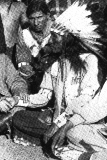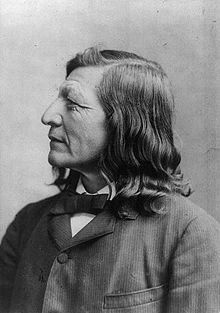

Luther Standing Bear (December
1868-February 20, 1939)(a/k/a Ota Kte "Plenty Kill" or "Mochunozhin").
Oglala Lakota Chief Luther Standing Bear is notable in American history
as one of the first Native American authors, educators, philosophers
and actors of the 20th century. Standing Bear fought to preserve Lakota
heritage and sovereignty and was at the forefront of a Progressive
movement to change government policy towards Native Americans. Standing
Bear was one of a small group of Lakota leaders of his generation, such
as Black Elk, Gertrude Bonnin and Charles Eastman, who were born and
raised in the oral traditions of their culture, educated in white
culture and wrote significant historic accounts of their people and
history in English. Luther’s experiences in early life, the Carlisle
Indian Industrial School, Wild Westing with Buffalo Bill and life on
government reservations present a unique view of a Native American
during of the Progressive Era in American history. Standing Bear’s
commentaries on Native American culture and wisdom educated the
American public, deepened public awareness and created popular support
to change government policies toward Native American peoples. Luther
Standing Bear helped create the popular 20th century image that Native
American culture is holistic and respectful of nature. Luther Standing
Bear's classic commentaries appear on college reading lists in
anthropology, literature, history and philosophy, and leave a legacy
and treasure of Native American wisdom.
"We did not think of the great open plains, the beautiful rolling hills, the winding streams with tangled growth, as 'wild'. Only to the white man was nature a 'wilderness' and only to him was it 'infested' with 'wild' animals and 'savage' people. To us it was tame. Earth was bountiful and we were surrounded with the blessings of the Great Mystery."
"If today I had a young mind to direct, to start on the journey of life, and I was faced with the duty of choosing between the natural way of my forefathers and that of the... present way of civilization, I would, for its welfare, unhesitatingly set that child's feet in the path of my forefathers. I would raise him to be an Indian!"
"Praise, flattery, exaggerated manners and fine, high-sounding words were no part of Lakota politeness. Excessive manners were put down as insincere, and the constant talker was considered rude and thoughtless. Conversation was never begun at once, or in a hurried manner.
"No one was quick with a question, no matter how important, and no one was pressed for an answer. A pause giving time for thought was the truly courteous way of beginning and conducting a conversation."
"From Wakan Tanka, the Great Spirit, there came a great unifying life force that flowed in and through all things -- the flowers of the plains, blowing winds, rocks, trees, birds, animals -- and was the same force that had been breathed into the first man. Thus all things were kindred, and were brought together by the same Great Mystery.
"Kinship with all creatures of the earth, sky and water was a real and active principle. In the animal and bird world there existed a brotherly feeling that kept the Lakota safe among them. And so close did some of the Lakotas come to their feathered and furred friends that in true brotherhood they spoke a common tongue.
"The animals had rights -- the right of man's protection, the right to live, the right to multiply, the right to freedom, and the right to man's indebtedness -- and in recognition of these rights the Lakota never enslaved an animal and spared all life that was not needed for food and clothing. For the animal and bird world there existed a brotherly feeling that kept the Lakota safe among them."
"This concept of life and its relations was humanizing and gave to the Lakota an abiding love. It filled his being with the joy and mystery of living; it gave him reverence for all life; it made a place for all things in the scheme of existence with equal importance to all."
"The Lakota could despise no creature, for all were of one blood, made by the same hand, and filled with the essence of the Great Mystery. In spirit, the Lakota were humble and meek. 'Blessed are the meek, for they shall inherit the earth' -- this was true for the Lakota, and from the earth they inherited secrets long since forgotten. Their religion was sane, natural, and human."
"The old Lakota was wise. He knew that a man's heart away from Nature becomes hard; he knew that lack of respect for growing, living things soon lead to a lack of respect for humans too."
"The old people came literally to love the soil and they sat or reclined on the ground with a feeling of being close to a mothering power."

The feathered and blanketed figure of the American Indian has come to symbolize the American continent. He is the man who through centuries has been moulded and sculpted by the same hand that shaped the mountains, forest, and plains, and marked the course of it rivers.
The American Indian is the soil, whether it be the region of forest, plains, pueblos, or mesas. He fits into the landscape, for the hand that fashioned the continent also fashioned the man for his surroundings. He once grew as naturally as the wild sunflowers; he belongs just as the buffalo belonged.
With a physique that fitted, the man developed fitting skills -- crafts which today are called American. And the body had a soul, also formed and moulded by the same master hand of harmony. Out of the Indian approach to existence there came a great freedom -- an intense and absorbing love for nature; a respect for life; enriching faith in a Supreme Power; and principles of truth, honesty, generosity, equity, and brotherhood....
Becoming possessed of a fitting philosophy and art, it was by them that native man perpetuated his identity; stamped it into the history and soul of this country -- made land and man one.
By living -- struggling, losing, meditating, i'm-bibing, aspiring, achieving -- he wrote himself into the ineraseable evidence -- an evidence that can be and often has been ignored, but never totally destroyed....
The white man does not understand the Indian for the reason that he does not understand America. He is too far removed from its formative processes. The roots of the tree of his life have not yet grasped the rock and soil. The white man is still troubled with primitive fears; he still has in his consciousness the perils of this frontier continent, some of its fastnesses not yet having yielded to his questing footsteps and inquiring eyes. The man from Europe is still a foreigner and an alien.
But the Indian the spirit of the land is still vested; it will be until other men are able to divine and meet its rhythms....
When the Indian has forgotten the music of his forefathers, when the sound of the tom-tom is no more, when the memory of his heroes is no longer told in story ... he will be dead. When from him has been taken all that is his, all that he has visioned in nature, all that has come to him from infinite sources, he then, truly, will be a dead Indian."
![]() Return to
Indigenous Peoples' Literature
Return to
Indigenous Peoples' Literature
Compiled by: Glenn Welker
This site has been accessed over 10,000,000 times since February 8,
1996.